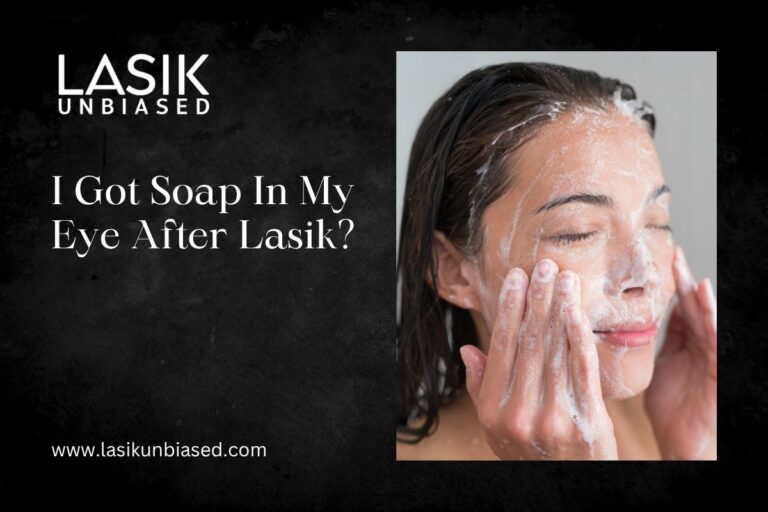If you get soap in your eye after LASIK, you may feel a strong burning or stinging sensation, but quick, gentle action can help minimise harm.
The key is to rinse your eye carefully and avoid rubbing, as your eyes are more vulnerable while healing.
LASIK surgery promises crisp, glasses-free vision, but the recovery period demands extra care. If you’ve just had LASIK and accidentally got soap in your eye, you’re not alone—this is a common concern for many patients. Let’s break down what happens, why it matters, and how to respond, so you can protect your healing eyes and stay on track for a smooth recovery.
Why Is It Problematic to Get Soap in Your Eye After LASIK?
Your Eyes Are More Sensitive After Surgery
LASIK works by creating a thin flap in your cornea, which then needs time to heal. During this period, your eyes’ natural defences are temporarily reduced, making them more sensitive to irritants and more susceptible to infection or injury. Soap, with its alkaline pH, can be particularly irritating and may lead to rubbing or inflammation, which could interfere with healing.
Potential Risks of Soap Exposure Post-LASIK
- Immediate discomfort: Stinging, burning, and watering are common when soap touches the eye, and these sensations may be heightened after LASIK.
- Temporary blurred vision: Irritation can cause your vision to blur for a short time.
- Infection risk: While soap itself doesn’t cause infection, irritation from it can lead to rubbing or inflammation, which may increase the chance of infection, especially with a healing flap.
- Flap complications: Rubbing or aggressive washing can dislodge the corneal flap, leading to serious complications that may require further medical attention.
Immediate Steps to Take If You Get Soap in Your Eye After LASIK
Stay Calm and Act Quickly
- Don’t rub your eye. Rubbing can spread the soap and, more importantly, risk moving the healing flap.
- Rinse gently with clean, cool water. Splash your eye with clean water or use sterile saline if available. Use your hands to cup the water and let it flow over your eye, but avoid forceful splashing.
- Blink repeatedly. This helps flush out any remaining soap.
- Use artificial tears. If the irritation continues, using lubricating eye drops can help calm your eye and wash away any remaining irritants.
When to Seek Medical Help?
- Persistent pain, redness, or blurred vision that doesn’t improve after rinsing
- Sudden decrease in vision
- Increased sensitivity to light
- Discharge from the eye
Should any of these symptoms arise, promptly contact your LASIK surgeon or eye care professional.
How Long Should You Keep Soap and Water Out of Your Eyes After LASIK?
The First Week Is Critical
- For at least the first 7 days after LASIK, avoid getting soap, shampoo, or any non-sterile water in your eyes.
- Use a gentle washcloth to clean your face, being careful to avoid the eye area.
- When showering, keep your eyes closed and tilt your head back to prevent water or soap from running into your eyes.
Why This Matters?
- The corneal flap is most vulnerable during the first week, and exposure to soap or water can increase the risk of infection or healing complications.
- Even after the first week, continue to be cautious for several more weeks, especially with swimming or activities involving water.
Dealing with Accidental Water Exposure in Your Eyes After LASIK
Similar Risks, Similar Response
Water—especially from non-sterile sources like tap water, pools, or lakes—can carry microbes and increase the risk of infection. If water enters your eyes, take the same precautions as you would with soap: rinse gently, avoid rubbing your eyes, and apply lubricating drops.
Safeguarding Your Eyes from Soap and Water Post-LASIK
Smart Showering and Face Washing Tips
- Close your eyes when washing your hair or face.
- Turn your face away from the stream of water in the shower.
- Use a washcloth to gently clean your face, avoiding the eye area.
- Wait until your surgeon gives the all-clear before resuming normal washing routines.
Other Helpful Aftercare Habits
- Wear protective goggles when sleeping for the first week to prevent accidental rubbing.
- Avoid swimming, hot tubs, and saunas for at least two to four weeks.
- Take all prescribed eye drops according to your doctor’s instructions to promote healing and minimise dryness.
Key Takeaways
- Getting soap in your eye after LASIK is uncomfortable but rarely causes permanent harm if you act quickly and gently.
- Rinse your eye thoroughly with clean water or saline, avoid rubbing, and use artificial tears if needed.
- Contact your eye doctor if pain, redness, or vision changes persist.
- For the first week after LASIK, be extra cautious to keep soap, shampoo, and water out of your eyes.
- Follow your surgeon’s aftercare instructions for the best recovery and vision results.
If you have questions or experience persistent symptoms after LASIK, don’t hesitate to call your eye doctor. Your vision is worth protecting—take every precaution to ensure a smooth and successful recovery.
Frequently Asked Questions About Soap in the Eye After LASIK
Is it dangerous to get soap in your eye after LASIK?
Yes, especially during the first week after surgery, it can be risky. Exposure can cause irritation and increase the chances of infection or flap displacement.
How long will the irritation last?
Most irritation resolves within minutes to a few hours after thorough rinsing. If symptoms persist, consult your doctor.
Can soap cause permanent damage after LASIK?
Permanent damage is rare if you act quickly and avoid rubbing. Prolonged exposure or aggressive rubbing could lead to complications, so prompt, gentle rinsing is key.
What kind of soap is safest if I have to wash my face?
Use a mild, fragrance-free soap and avoid the eye area completely for the first week. Pat your face dry gently with a clean towel.


